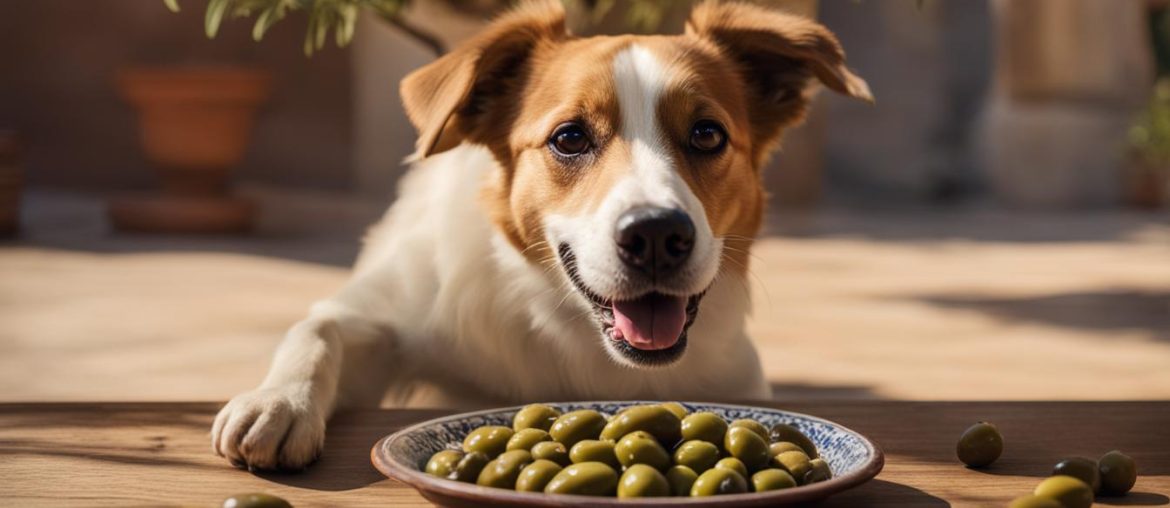Welcome to this informative article where we will explore whether olives are suitable for our furry companions. As a pet owner, it’s essential to understand the potential benefits and risks associated with feeding olives to dogs. So, can dogs eat olives? Let’s dive in and find out!
Key Takeaways:
- Olives can be a healthy treat for dogs when given in moderation.
- Olives are rich in antioxidants, vitamin E, and essential fatty acids, which can improve dogs’ immune system, brain function, bone health, and heart health.
- Dogs can safely eat plain and unsalted olives, but it’s crucial to avoid olive pits as they can be a choking hazard.
- Moldy olives, canned or pickled olives with high sodium content, stuffed olives with unsuitable ingredients, and olives in alcoholic beverages should be avoided.
- The amount of olives dogs can eat depends on their size and tolerance, and it’s important to introduce new foods slowly and monitor for any adverse reactions.
The Health Benefits of Olives for Dogs
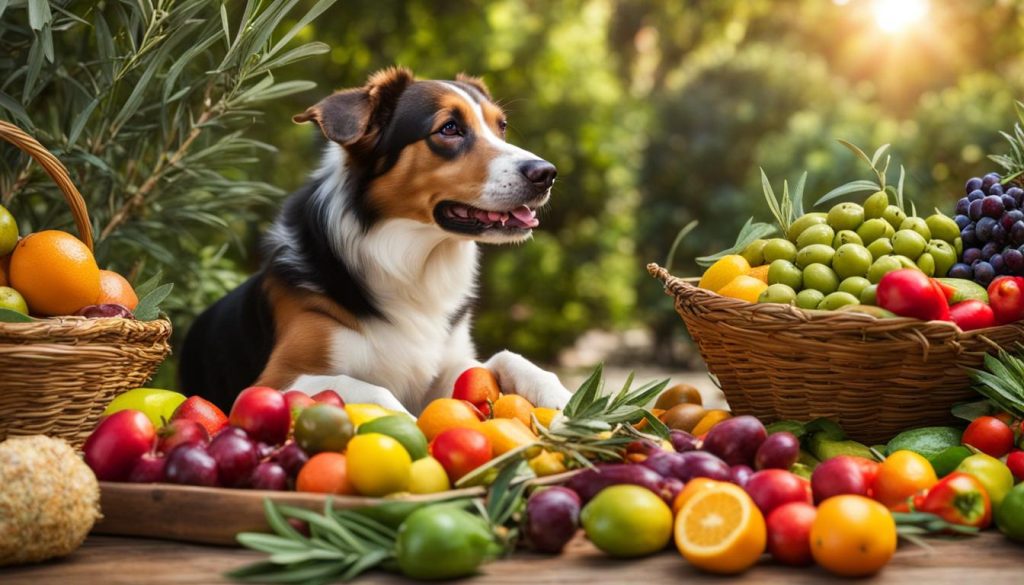
Olives offer numerous health benefits for dogs. Their rich antioxidant content helps boost the immune system and protect against free radicals that can cause cellular damage. Additionally, olives are a great source of vitamin E, which promotes healthy skin and coat. The essential fatty acids found in olives contribute to improved brain function and can support cognitive health in dogs.
Not only do olives provide essential nutrients, but they also have anti-inflammatory properties that can support joint health and reduce the risk of chronic diseases, such as arthritis. The antioxidants in olives can also help reduce cholesterol levels and support cardiovascular health in dogs. Including olives in a dog’s diet can contribute to their overall well-being and help maintain a healthy, balanced lifestyle.
| Health Benefits of Olives for Dogs |
|---|
| Boosts immune system |
| Promotes healthy skin and coat |
| Improves brain function |
| Supports joint health |
| Reduces cholesterol levels |
| Supports cardiovascular health |
Please be aware that while olives offer health benefits, they should still be given in moderation and as part of a balanced diet. Consult with a veterinarian to determine the appropriate amount of olives for your dog based on their specific needs and health conditions. By incorporating olives into your dog’s diet, you can provide them with a delicious and nutritious treat that supports their overall health and well-being.
Are Olives Safe for Dogs?
While olives can be a healthy addition to a dog’s diet when given in moderation, there are some risks to consider. It’s important to be aware of the potential hazards associated with olives to ensure the safety and well-being of your furry friend.
One of the main risks is the olive pits, which can be a choking hazard for dogs. If swallowed whole or if the dog chews on them and breaks off pieces, the pits can cause digestive issues and potentially lead to an obstruction in the gastrointestinal tract. Therefore, it is crucial to remove the pits before giving olives to your dog.
Another risk is moldy olives or olives with mold on them. These can contain harmful toxins that can cause various health problems in dogs, including tremors or seizures. It’s essential to check the olives for any signs of mold and avoid feeding them to your dog if you find any.
Canned or pickled olives with high sodium content should also be avoided. High levels of sodium can lead to dehydration, electrolyte imbalances, and other health issues in dogs. It’s best to opt for plain and unsalted olives to ensure your dog’s well-being.
| Risks of Giving Olives to Dogs |
|---|
| Choking hazard from olive pits |
| Toxicity from moldy olives |
| High sodium content in canned or pickled olives |
What Kind of Olives Can Dogs Eat?
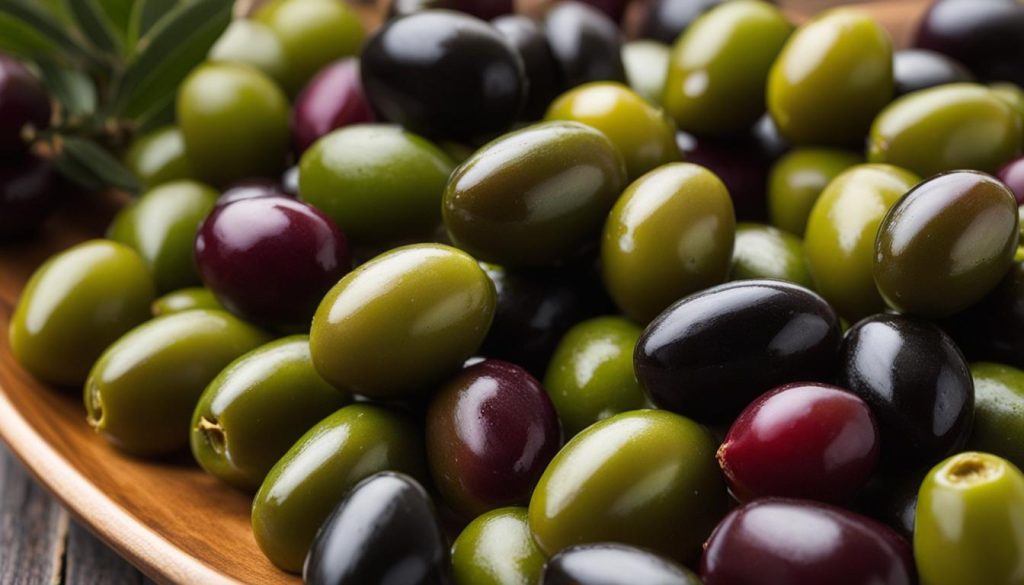
Dogs can enjoy a variety of olives, as long as they are plain and unsalted. Here are the types of olives that are safe for dogs to eat:
- Green olives: These olives are unripe and have a firmer texture with a slightly bitter taste. Dogs can have green olives as a treat.
- Black olives: Ripe black olives are safe for dogs to eat. They have a softer texture and a milder flavor compared to green olives.
- Kalamata olives: Kalamata olives, which are popular Greek olives, can also be given to dogs as long as they are pitted and unsalted.
It’s important to avoid olives with high salt content, as excessive sodium can be harmful to dogs. By choosing plain and unsalted olives, you can ensure that your furry friend can enjoy the taste and benefits of olives without any potential health risks.
Remember, moderation is key when feeding olives to your dog. While olives can be a healthy treat, it’s important to offer them in appropriate quantities to prevent overconsumption and potential digestive issues. As always, if you have any concerns or questions about feeding olives to your dog, consult with your veterinarian for personalized advice and guidance.
“Dogs can safely enjoy a variety of olives, including green olives, black olives, and Kalamata olives. Just make sure they are plain and unsalted!” – Veterinarian Dr. Smith
How Much Olives Can Dogs Eat?
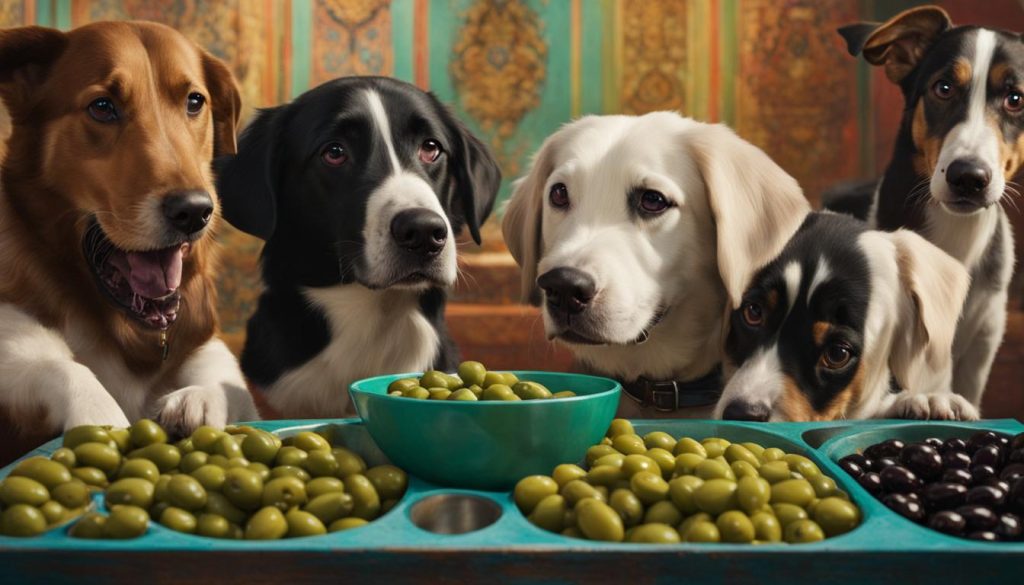
Feeding olives to dogs can be a healthy and enjoyable treat, but it’s important to understand the appropriate amount to give them. Dogs can safely consume olives in moderation, but the quantity depends on their size and tolerance. As a general guideline, dogs can have one or two olives occasionally as a snack. However, it’s crucial to monitor their consumption and avoid overfeeding, as too many olives can lead to digestive issues or weight gain.
When introducing olives to your dog’s diet, it’s recommended to start with a small amount and observe their reaction. Some dogs may have a sensitive stomach and may experience diarrhea or other digestive discomfort if they consume too many olives. It’s always best to consult with your veterinarian, especially if your dog has underlying health conditions or dietary restrictions.
The key is to feed your dog plain and unsalted olives, as excessive salt can be harmful to their health. Additionally, it’s essential to remove the pit from the olive before giving it to your dog to prevent choking hazards. Remember that olives should be considered an occasional treat and not a substitute for a balanced dog food diet. By following these guidelines and monitoring your dog’s response, you can safely incorporate olives into their diet as a flavorful and nutritious snack.
Dog Treats Infused with Olives

If you’re a pet owner looking to add the delicious flavor of olives to your dog’s diet in a convenient and controlled way, there are dog treats available that are infused with olives. One popular option is OlviPet Healthy Bites, which are specially formulated with extra virgin olive oil, chia seeds, and pumpkin seeds. These treats not only provide the irresistible taste of olives but also offer additional health benefits for your furry friend. With their rich source of antioxidants and essential fatty acids, OlviPet Healthy Bites can contribute to improved immunity, fresher breath, and healthier teeth for your dog.
Another great option is OlviPet Healthy Bites Twists. These treats are made with the same high-quality ingredients as the original Healthy Bites but with a twist! The twisted shape adds an element of fun and excitement to treat time while still offering the same health benefits. Whether you choose the original Healthy Bites or the Twists, these olives-infused dog treats are sure to be a hit with your canine companion.
“My dog absolutely loves OlviPet Healthy Bites. It’s a great way to give her the taste of olives without worrying about the potential risks of feeding her plain olives. Plus, I love that they offer additional health benefits. It’s a win-win!” – Happy OlviPet customer.
Table: Comparison of OlviPet Healthy Bites vs. OlviPet Healthy Bites Twists
| Treat | Ingredients | Benefits |
|---|---|---|
| OlviPet Healthy Bites | Extra virgin olive oil, chia seeds, pumpkin seeds | – Improved immunity – Fresher breath – Healthier teeth |
| OlviPet Healthy Bites Twists | Extra virgin olive oil, chia seeds, pumpkin seeds | – Improved immunity – Fresher breath – Healthier teeth – Fun twisted shape |
With these olives-infused dog treats, you can give your canine companion a tasty and nutritious snack that they’ll love. Just remember to incorporate them into your dog’s diet in moderation and consider their individual dietary needs and preferences. Consult with your veterinarian if you have any concerns or questions about adding olives-infused treats to your dog’s routine. Enjoy treating your four-legged friend to the deliciousness of olives with OlviPet Healthy Bites or OlviPet Healthy Bites Twists!
What Food Can Dogs Eat?
As pet owners, we want to make sure we’re feeding our dogs the right kind of food that will nourish their bodies and support their overall health. So, what food can dogs eat? Well, it’s essential to choose dog food that meets their specific dietary requirements. For puppies, it’s recommended to feed them puppy kibble designed for their nutritional needs during the first six months of their life. Consulting with a veterinarian and following their advice on transitioning to adult dog food is crucial for their growth and development.
When determining the right dog food for your furry friend, it’s important to read and understand the ingredients list on the dog food bag. Look for recognizable and nutritious ingredients listed as the first 3-5 items. Avoid fillers and low-quality ingredients that offer little nutritional value. The quality of the food plays a significant role in a dog’s diet, so choose a brand that meets their nutritional needs and supports their overall health.
Table: Key Considerations for Choosing Dog Food
| Consideration | Description |
|---|---|
| Nutritional Needs | Ensure the dog food provides the necessary nutrients for your dog’s age, breed, and size. |
| Recognizable Ingredients | Look for dog food with recognizable and nutritious ingredients listed as the first 3-5 items. |
| Avoid Fillers | Avoid dog food that contains fillers and low-quality ingredients that offer little nutritional value. |
| Consult a Veterinarian | Consult with a veterinarian to determine the specific dietary needs of your dog and receive personalized recommendations. |
Choosing the right food for your dog is crucial for their overall well-being. By considering their nutritional needs, understanding the ingredients, and consulting with a veterinarian, you can ensure that you’re providing them with the best food possible to support their health and happiness.
How Much Food Should a Dog Eat?
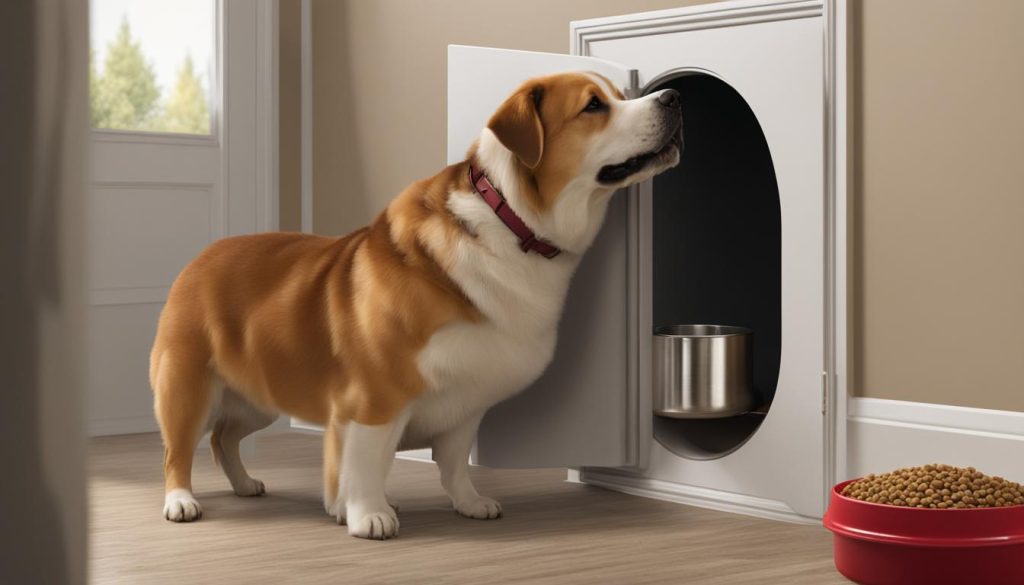
When it comes to determining how much food a dog should eat, several factors need to be considered, including size, weight, age, breed, and activity level. It’s essential to provide dogs with the appropriate portion sizes to maintain a healthy weight and prevent obesity, as overfeeding can lead to various health issues. To determine the right amount of food for your dog, it’s recommended to follow the guidelines provided on the dog food bag. These guidelines typically offer a general range based on your dog’s weight and activity level.
Please be aware that these guidelines are just a starting point, and you may need to adjust the portion sizes based on your dog’s individual needs. Each dog is unique, and some may require more or less food depending on their metabolism and energy requirements. Monitoring your dog’s weight and body condition is crucial in determining if you are feeding the right amount. If your dog is gaining weight or becoming overweight, you may need to reduce the portion size. Conversely, if your dog is losing weight or appears too thin, increasing the portion size may be necessary.
To prevent overfeeding, it’s recommended to measure the daily portion of food rather than free-feeding. Measuring the food ensures that your dog is receiving the appropriate amount of calories for their needs. Additionally, treats should be given in moderation and should not exceed 10% of your dog’s daily food allowance. It’s important to keep track of your dog’s overall calorie intake and ensure that it aligns with their energy requirements.
Key Points:
- Determine the right amount of food for your dog based on their size, weight, age, breed, and activity level.
- Follow the guidelines provided on the dog food bag, but remember that individual adjustments may be necessary.
- Monitor your dog’s weight and body condition to ensure they are maintaining a healthy weight.
- Measure the daily portion of food to prevent overfeeding, and limit treats to no more than 10% of your dog’s daily food allowance.
Is Human Food Good for Dogs?
When it comes to feeding our furry friends, it’s essential to understand which human foods are safe for dogs. While some human foods can be shared with dogs and even offer additional health benefits, it’s crucial to be cautious and selective. Certain fruits and vegetables can cause digestive issues or be toxic to dogs, so it’s important to research and understand which foods are safe.
Safe Human Foods for Dogs:
- Lean meats such as chicken and turkey (cooked and boneless)
- Carrots, green beans, and sweet potatoes (cooked and plain)
- Apples (core removed) and blueberries
- Peanut butter (without xylitol, a natural sweetener that is toxic to dogs)
These human foods can be offered as treats or used during training sessions to provide incentives and rewards. However, it’s important to remember that not all human foods are safe for dogs, and some can be harmful. Foods such as chocolate, grapes, raisins, onions, garlic, and avocados should never be given to dogs as they can be toxic and potentially life-threatening.
“It’s crucial to research and understand which foods are safe.”
It’s always recommended to consult with a veterinarian before introducing any new foods to your dog’s diet. They can provide guidance based on your dog’s specific needs, health conditions, and dietary restrictions. Taste tests can also be conducted to determine your dog’s preferences and ensure they enjoy the new foods you offer.
| Safe Human Foods for Dogs | Foods to Avoid |
|---|---|
| Lean meats (cooked and boneless) | Chocolate |
| Carrots, green beans, and sweet potatoes (cooked and plain) | Grapes and raisins |
| Apples (core removed) and blueberries | Onions and garlic |
| Peanut butter (without xylitol) | Avocados |
Human Foods for Dog Training
Using certain human foods during dog training sessions can be highly effective. These foods serve as tasty rewards and incentives for your dog’s good behavior. Here are a few examples of human foods that are often used for dog training:
- Cooked chicken or turkey pieces
- Small cubes of cheese
- Peanut butter
- Freeze-dried liver treats
These foods can be broken into small pieces and used as positive reinforcement during training sessions. Just remember to adjust your dog’s regular meals accordingly to avoid overfeeding and to maintain a balanced diet.
Feeding your dog human food can enhance their diet and provide variety, but it’s crucial to prioritize their safety and well-being. Always consult with a veterinarian and conduct research to ensure you’re offering safe and appropriate human foods to your furry friend.
Olive Oil for French Bulldogs
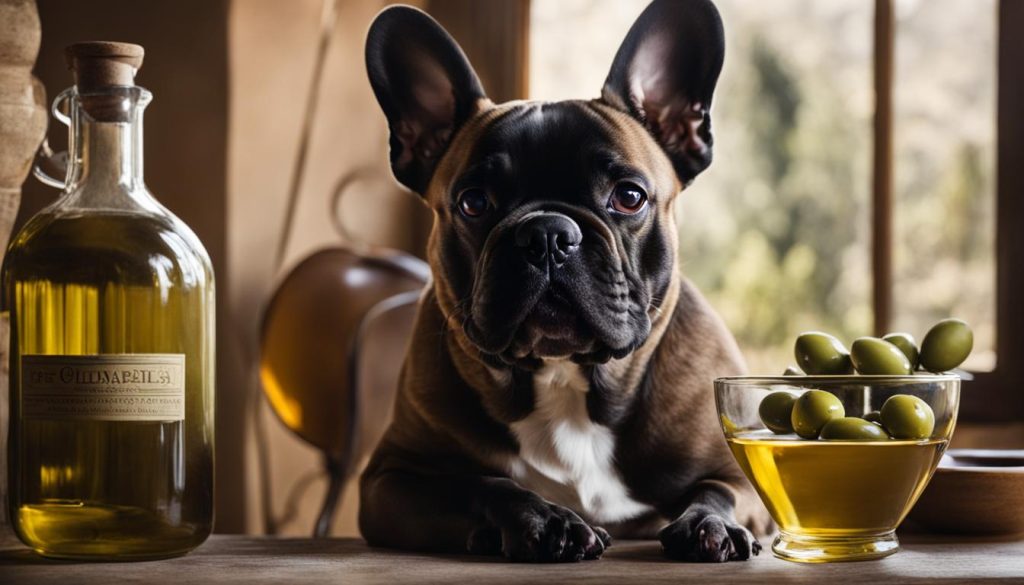
Olive oil can provide several health benefits for French Bulldogs when included in their diet. It offers a range of advantages, including improved coat and skin health, a boosted immune system, potential weight loss, brain health, and as a source of energy. However, it’s essential to exercise caution when introducing olive oil to a French Bulldog’s diet, as some dogs may have sensitive stomachs and may experience vomiting, diarrhea, or other adverse reactions.
To determine if olive oil is suitable for your French Bulldog, it is recommended to consult with a veterinarian. They can assess your dog’s individual health needs and provide guidance on incorporating olive oil into their diet. This is particularly crucial if your French Bulldog has pre-existing health conditions such as pancreatitis.
When feeding olive oil to your French Bulldog, it’s important to use it sparingly to avoid potential digestive issues and weight gain. Start with small amounts and gradually increase if your dog tolerates it well. It’s also recommended to choose high-quality, extra virgin olive oil that is free from additives or preservatives. By following these guidelines and seeking professional advice, you can safely incorporate olive oil into your French Bulldog’s diet and potentially reap the health benefits it offers.
Health Benefits of Olive Oil for French Bulldogs:
- Improved coat and skin health
- Boosted immune system
- Potential weight loss
- Brain health
- Source of energy
Wrapping Up
To summarize, olives can be a safe and healthy addition to a dog’s diet when given in moderation. Dogs can eat olives, but it’s important to take certain precautions to ensure their safety and well-being.
When feeding olives to dogs, it’s crucial to choose plain and unsalted varieties to avoid any potential health risks. Removing the pits is essential to prevent choking hazards. It’s also important to steer clear of moldy olives, canned or pickled olives with high sodium content, stuffed olives with unsuitable ingredients, and olives in alcoholic beverages.
If you’re looking to incorporate olives into your dog’s diet, there are dog treats available that are infused with olives. These treats can provide the delicious flavor of olives along with additional health benefits. However, it’s still important to offer olives as an occasional treat and monitor your dog’s intake to prevent choking and overconsumption.
Incorporating olives into a dog’s diet can provide them with antioxidants, essential fatty acids, and vitamins that can improve their overall health. Just remember to feed them plain and unsalted olives, remove the pits, and choose appropriate quantities based on their size and tolerance.
FAQ
Can dogs eat olives?
Yes, olives can be given to dogs in moderation.
Are olives safe for dogs?
Olives are safe for dogs to eat as long as they are plain and unsalted.
What are the health benefits of olives for dogs?
Olives can improve a dog’s immune system, brain function, bone health, and heart health due to their antioxidants, vitamin E, and essential fatty acids.
Are there any risks of giving olives to dogs?
Yes, olive pits can be a choking hazard, and moldy olives or olives with high sodium content can be harmful to dogs. Stuffed olives with unsuitable ingredients and olives in alcoholic beverages should also be avoided.
What kind of olives can dogs eat?
Dogs can eat plain and unsalted olives, including green olives, black olives, and Kalamata olives.
How much olives can dogs eat?
Dogs should have olives as an occasional treat, and the amount should be limited to prevent choking and overconsumption.
Are there dog treats infused with olives?
Yes, dog treats like OlviPet Healthy Bites and OlviPet Healthy Bites Twists are available, which contain olives along with other beneficial ingredients.
What food can dogs eat?
Dogs should be fed high-quality dog food that meets their nutritional needs. It’s important to choose a brand with recognizable and nutritious ingredients and to transition puppies to adult dog food based on a veterinarian’s advice.
How much food should a dog eat?
The amount of food a dog needs depends on their size, weight, age, breed, and activity level. It’s important to follow the guidelines on the dog food bag and avoid overfeeding to prevent obesity.
Is human food good for dogs?
Some human foods can be safe and beneficial for dogs, but it’s important to research and understand which ones are suitable. It’s recommended to consult with a veterinarian before introducing any new human foods into a dog’s diet.
Can French Bulldogs eat olive oil?
Olive oil can be beneficial for French Bulldogs, but it’s important to consult with a veterinarian before adding it to their diet. Some French Bulldogs may have sensitive stomachs and experience adverse reactions to olive oil.


